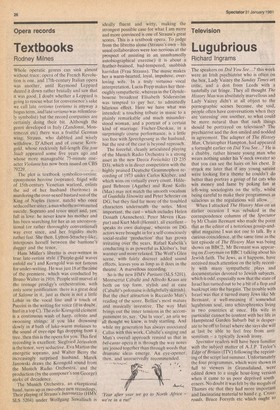Opera records
Textbooks
Rodney Milnes
Whole operatic genres can sink almost without trace; opera of the French Revolution is one, and 17th-century Italian opera was another, until Raymond Leppard dusted it down rather brutally and saw that it was good. I doubt whether a Leppard is going to rescue what for convenience's sake we call late verismo (verismo is anyway a bogus term. and late verismo was relentlessly symbolist) but the record companies are certainly doing their bit. Although the genre developed in Italy (Zandonai, Montemezzi etc) there was a fruitful German wing: Straus, who dabbled and wisely withdrew, D'Albert and of course Korngold, whose recklessly full-length Die .tote Stadt appeared some five years ago and whose more manageable 75-minute oneacter Violanta has now been issued on CBS 79229.
The plot is textbook symbolico-verista: eponymous heroine (soprano), frigid wife of 15th-century Venetian warlord, enlists the aid of her husband (baritone) in murdering the over-sexed bastard son of the King of Naples (tenor, natch) who once seduced her sister, a nun whothen corn mined suicide. Soprano and tenor meet and, yes; fall in love: he never knew his mother and has been searching for her in an unconventional (or rather thoroughly conventional) way ever since, and her frigidity melts rather fast. She then, Lytton-Strachey-like, interposes herself between the baritone's dagger and the tenor.
Hans Miillers libretto is over-written in true late-verista style (Purple-gold waves enfold me') and Korngold was not famous for under-writing. He was just 18 at the time of the premiere, which was conducted by Bruno Walter in 1916. People still marvel at the teenage prodigy's orchestration, with only some justification: there is a great deal of Salome in it, just as there is not a little Leliar in the vocal line and a touch of Puccini in the writing for voice (if in doubt, hurl in a top C). The echt-Korngold element is a continuous wash of harp, celeste and swooning strings: if you like drowning slowly in a' bath of luke-warm molasses to the sound of over-ripe figs dropping from a tree, then this is the opera for you. This first recording is excellent: Siegfried Jerusalem is the tenor, very seductive, Eva Marton the energetic soprano, and Walter Berry the increasingly surprised husband. Muck Janowski draws the Korngold sound from the Munich Radio Orchestra, and the production (by the composer's son George) reeks of decadence.
The Munich Orchestra, an exceptional band, turns up in two other new recordings. Their playing of Strauss's intermezzo (HMV SLS 5204) under Wolfgang Sawallisch is ideally fluent and witty, making the strongest possible case for what I. am more and more convinced is one of Strauss's great scores. This is a textbook opera. To judge from the libretto alone (Strauss's own — his usual collaborators were too nerVous at the prospect of assisting in an unashamedly autobiographical exercise) it is about a feather-brained, bad-tempered, snobbish harridan (Frau Strauss). The music makes her a warm-hearted, loyal, impulsive, overloving wife. In a truly virtuoso vocal interpretation, Lucia Popp makes her thoroughly,sympathetic, whereas in the Glyndebourne broadcast Elisabeth ,S6derstrom was tempted to guy her, to. admittedly hilarious effect. Here we have what was intended: a touching tribute in music to a plainly remarkable and much misunderstood woman, and a portrait of a certain kind of marriage. Fischer-Dieskau, in a surprisingly coarse performance, is a little too free with Sprechgesang as the husband, but the rest of the cast is beyond reproach.
The forceful, cleanly articulated playing of the Munich Radio Orchestra is a strong asset in the new Decca Freischiitz (D 235 D3), which is in direct competition with the highly praised Deutsche Grammophon recording of 1973 under Carlos Kleiber, and which wins on virtually every count. Hildegard Behrens (Agathe) and Rene Kollo (Max) may not match the smooth, vocalism of Gundula Emowitz and Peter Schreier on DG, but they find far more of the troubled characters underneath the notes. Most important, the cast — which includes Helen Donath (Aennchen). Peter Meven (Kaspar) and Kurt Moll (Hermit), all excellent — speaks its own dialogue, whereas on DG actors were brought in for a self-consciously social-realist 'production' that has 'grown irritating over the, years. Rafael Kubelik's conducting is as powerful as Kleiber's, but warmer and more relaxed. The Wolf's Glen scene, with fairly discreet added sound effects, leaves you as limp as it does in the theatre. A marvellous recording.
So is the new HMV Puritani (SLS 52(11). Montserrat Caballe and Alfredo Kraus are both on top form, stylish and at ease (Caballe's polonaise is delightfully skittish). But the chief attraction is Riccardo Muti:s reading of the score. Bellini's most mature and musically inventive. The way Muti brings out the inner tensions in the accompaniment to, say, 'Qui la voce', an aria we all thought we knew, is truly startling. And while my generation has always associated Callas with this work. Caballe's singing and Muti's overall approach remind us that in bel-canto opera it is through the way notes are joined together than through words that dramatic ideas emerge. An eye-opener, then, and unreservedly recommended.
'Year after year we're in a rut!' we go to North






































 Previous page
Previous page